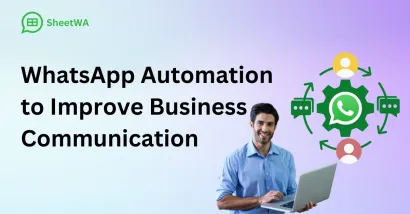
You can change how your business talks to people by using WhatsApp message automation. Automated WhatsApp systems let you answer messages faster. They help you connect with customers better. They also make work easier by doing some jobs for you. More than 50 million businesses use WhatsApp Business tools all over the world. Companies say they reply 35% faster with chatbots. They also say customer happiness goes up by 70%. The table below shows important numbers:

WhatsApp message automation helps you stay ahead and work well. It lets you meet what customers want and make every chat better.
Key Takeaways
WhatsApp automation lets businesses answer customers faster and connect better. This saves time and makes customers happier.
Automated messages help keep talks clear, safe, and the same every time. This helps customers trust your business and want to come back.
You should use customer names and past orders in messages. This makes replies feel personal, not like a robot. Robotic replies can make customers leave.
Pick the best WhatsApp automation tool for your business. Think about your business size, goals, and if you need chatbots or CRM integration.
Test your automated messages often. Watch how they work to make replies better and keep customers happy.
Use chatbots and set messages to send at certain times. This gives support all day, sends reminders, and helps with marketing.
Always follow WhatsApp rules and privacy laws. This keeps your business safe and respects what customers want.
Automating WhatsApp messages can help your business grow. It makes customer support, marketing, lead management, and reminders better.
Why Automate WhatsApp Messages
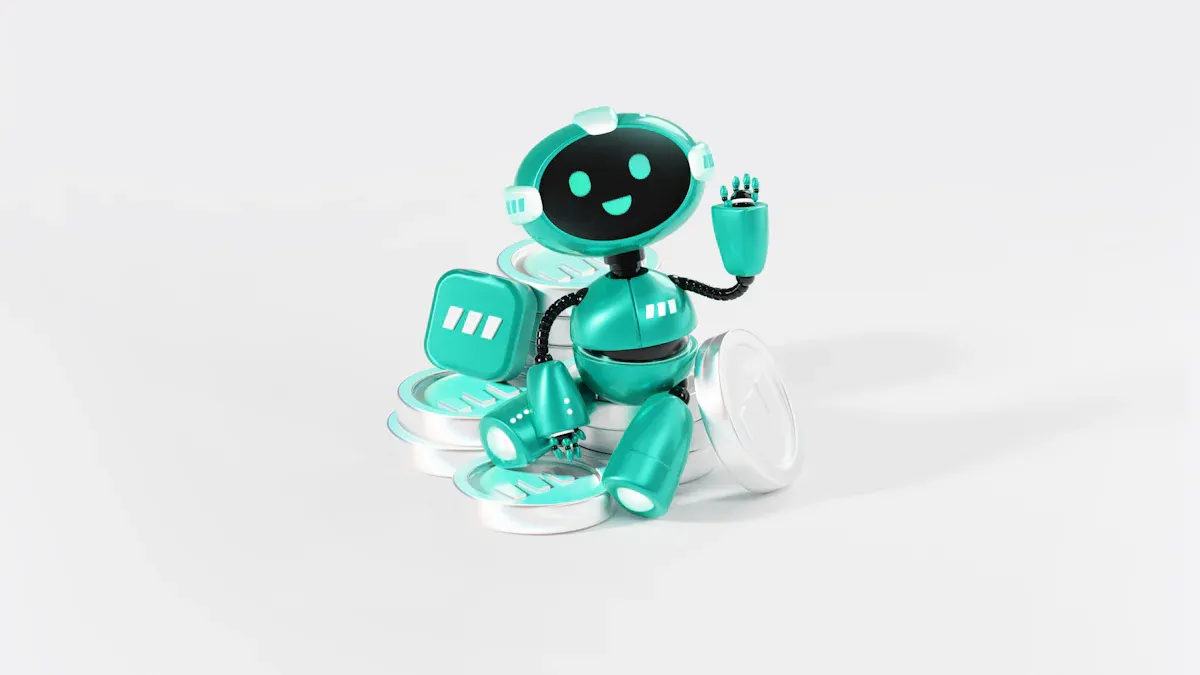
When you automate WhatsApp messages, you change how you talk to customers. You can reach more people and reply much faster. Many companies use automation because it saves time. It also helps you talk to customers better. WhatsApp has over 2 billion users around the world. This makes it a strong tool for business communication.
Key Benefits
Speed
Customers want answers fast. Automated WhatsApp messages let you reply right away, even when your business is closed. You can send quick answers to common questions. You can also send order updates and reminders for appointments. Using automated messages means agents spend 35% less time than with phone or email. Customers get help without waiting long.
You can remind people to pay on time.
New customers get welcome messages right away.
You can send messages to help recover lost sales.
Delivery updates keep customers in the loop.
Chatbots can answer questions all day and night.
Automated WhatsApp messages make sales happen faster. Customers can look at catalogs, ask questions, and buy things in the app. Every chat becomes easier and quicker.
Consistency
Automated WhatsApp messages help you keep your messages clear and steady. You always send the same good information. Customers get updates, reminders, and help without mistakes. Automation makes sure you never miss a message or forget to follow up.
Tip: Use WhatsApp Business analytics to check if your messages are sent, opened, and answered. This helps you make your messages better.
Automated messages help customers trust you. WhatsApp uses end-to-end encryption, so their info is safe. You can also reach customers any time, which makes them happier and more loyal.
Common Challenges
Automating WhatsApp messages is helpful, but there are some problems to watch for. If your messages are too general, customers may feel left out. You should use names or past orders to make messages personal. Split your contacts into groups so each group gets the right info.
Challenge | Description | Solution |
|---|---|---|
Generic Messages | Boring messages make customers unhappy | Use names and what they like |
Lack of Segmentation | Sending the same message to everyone is not smart | Put contacts into different groups |
Improper Automation Flow | Mixed-up messages confuse people | Make clear and simple message paths |
Not Complying with Policies | Breaking WhatsApp rules can get your account blocked | Always follow WhatsApp rules |
Message Delivery Failures | Wrong numbers or message problems | Check numbers and get message approval |
Robotic Feel | Stiff words make customers leave | Use friendly, real language |
Ignoring Timing | Messages at bad times upset people | Send messages at the right time |
Test your automated messages before you use them. Watch how people react and change things if needed. Clean up your contact list so you do not message people who are not active. Use clear steps so customers know what to do next.
Automated WhatsApp messages help your business grow without hiring more people. You make it easier to talk to customers and keep them happy. When you use automation, you build better chats and stronger bonds.
WhatsApp Message Automation Overview
What Is WhatsApp Message Automation
WhatsApp message automation can change how your business talks to people. It uses software or chatbots to send messages for you. You do not have to type each message yourself. You set up messages ahead of time or use triggers. These messages go out right away. Customers get quick and steady replies every time.

Read More: Key Trends in WhatsApp Bulk Messaging for Businesses in 2026
Here is a table that shows how WhatsApp message automation is different from manual messaging:
Aspect | WhatsApp Message Automation | Manual Messaging |
|---|---|---|
Definition | Software or chatbots send messages without people typing. | A person types and sends each message by hand. |
Response Time | Messages are sent instantly by the system. | Replies depend on when a person is free. |
Personalization | Uses templates, but AI can make messages more personal. | Messages can be changed for each person and situation. |
Scalability | Can send lots of messages at once, good for busy times. | Can only send a few messages at a time, which can slow things down. |
Cost Efficiency | Saves time and work, so it costs less to help customers. | Takes more time and effort, so it costs more. |
Nature of Interaction | Messages always sound the same and match your brand. | Messages can be more detailed and feel more personal. |
With WhatsApp message automation, you can send greetings, updates, and reminders. You do not need to check your phone all day. Your business can talk to more customers at once. This helps your business grow.
How It Works
Automating WhatsApp chats uses different steps and tools. You can pick the WhatsApp Business App, the WhatsApp Business API, or other tools. Each one has special features for sending automated messages.
WhatsApp Business App Features
The WhatsApp Business App gives you simple ways to automate messages. You can set up:
Greeting messages for new customers.
Away messages when you are not there.
Quick replies for common questions.
You do not need to know how to code. The app helps you automate easy tasks. It works best for small businesses or those with fewer messages. You can only have one user per account. Most messages still need to be sent by hand.
Read More: How to Use WhatsApp Web for Business Success in 2026
WhatsApp Business API
The WhatsApp Business API and WhatsApp Cloud API help bigger businesses automate more. You can:
Use chatbots to send messages automatically.
Make message templates for orders and updates.
Connect with CRM systems to send messages when things happen.
The WhatsApp Business API can handle lots of messages and manage teams. You can set up complex steps and make sure every customer gets the right message. The WhatsApp Cloud API helps you grow and manage automations for your whole company.
Feature / Use Case | WhatsApp Business App (Basic Automation) | WhatsApp Business API (Advanced Automation) |
|---|---|---|
Automation Setup | Set up greetings, away messages, and quick replies without coding. | Use chatbots, templates, and triggers with API setup. |
Chatbot and Complex Interactions | Only simple questions and manual replies are supported. | Chatbots can handle hard questions and customer journeys. |
Integration with CRM and Business Systems | Not possible; you must update things by hand. | Connects with CRM using API for real-time updates and workflows. |
Automated Transactional Messaging | Limited; confirmations and reminders must be sent by hand. | Sends order updates and notifications automatically to many people. |
High Volume Message Handling | Not good for lots of messages; needs manual work. | Built for sending many messages with strong systems. |
Data Security and Compliance | Basic encryption is included. | Follows strict data rules and lets teams control access. |
User and Team Management | Only one user can manage messages. | Many users can work together with different roles. |
Use Cases for Automated WhatsApp Messages
Customer Support
Automated WhatsApp business messages can make customer support better. When you use automation, you answer questions faster and with fewer mistakes. Many businesses set up replies for common questions, order tracking, and refunds. This means customers get help all day and night, even if your team is away. A chatbot can solve easy problems and send hard ones to a real person.

Here are some ways automated WhatsApp business messages help customer support: 1. Quick answers to FAQs and troubleshooting. 2. Updates on orders and deliveries. 3. Help with refunds and returns. 4. Sending tough questions to live agents. 5. Welcome messages and guides after buying.
A chatbot can ask for feedback and help with warranty sign-ups. This makes less work for your team and lets them focus on better service. Many companies have made their service twice as fast and made customers happier by 200% with WhatsApp automation. You can also reach more people because many already use WhatsApp.
Metric/Outcome | Description |
|---|---|
Customer Satisfaction | Went up by 200% with WhatsApp and automated question sorting. |
Service Efficiency | Doubled by using chatbots and workflow tools. |
24/7 Support Availability | Chatbots give help any time, making it easier for customers. |
Tip: Use WhatsApp analytics to see how fast you answer and find ways to get better.
Notifications and Reminders
Automated WhatsApp business messages help keep your customers in the loop. You can send alerts about orders, appointments, and payments. These messages help stop missed appointments and keep customers updated.
Some common automated WhatsApp messages for reminders and notifications are: - Order and shipping updates. - Payment receipts and fraud warnings. - Appointment reminders and confirmations. - Alerts about sales or new items. - Asking for feedback after a purchase. - Updates on support tickets. - Notices about account changes or security. - Confirming reservations for hotels or restaurants. - OTPs for safe actions.
For example, a clinic can send reminders so people do not miss visits. An online shop can send updates about orders and payments. These automated WhatsApp business messages make sure your messages are always on time.
WhatsApp Marketing Automation
WhatsApp marketing automation helps you talk to more customers and sell more. You can send special offers, product tips, and reminders about carts left behind. Automated WhatsApp business messages help you reach customers at the best time and get more sales.
Some top features of WhatsApp marketing automation are: - Sending lots of messages to many people at once. - Making messages personal based on what customers like. - Tools to build campaigns for welcomes and follow-ups. - Connecting with CRM systems for better targeting. - Chatbots to answer FAQs and product questions. - Analytics to see who opens messages and who buys.
You can use WhatsApp marketing automation in many fields. For example, real estate agents send home ideas and set up tours. Online stores send product news and reminders about carts. Edtech companies send class reminders and study tips. With automated WhatsApp business messages, you save time, spend less, and get better marketing results.
Note: WhatsApp messages are opened a lot—up to 98%. This means your automated messages are more likely to be seen than emails or texts.
Lead Management
Taking care of leads helps your business grow. WhatsApp automation makes it easier to find and talk to leads. You can send messages fast and keep people interested in what you sell.
WhatsApp can reply right away when someone is interested. If a customer fills out a form, they get a welcome message in seconds. Fast replies make your business look good and keep people talking. Chatbots can answer easy questions and share product info. They can also help leads move through your sales steps.
Here are ways WhatsApp automation helps with leads:
You send greetings and follow-ups as soon as you get a lead.
Reminders help leads remember meetings or special deals.
Quick replies and buttons let leads ask questions or book meetings.
CRM tools help you track chats and see who is most interested.
Drip campaigns keep your business in their mind without extra work.
Pictures and videos show your products and help build trust.
Almost everyone opens WhatsApp messages—up to 98%. This is much better than email. WhatsApp feels personal and friendly, so leads trust you more. Using WhatsApp with email can help you get 20% more sales. Some companies get 25% more sign-ups and 30% happier customers with WhatsApp automation.
Tip: Use WhatsApp analytics to check open rates, clicks, and replies. This helps you see what works and make your plan better.
You can use WhatsApp to score leads. Automation tools help you find leads who want to buy. You can spend more time on these good leads. Automated follow-ups help you never miss a chance to talk.
Benefit | How WhatsApp Automation Helps |
|---|---|
Fast Response | Sends quick replies to new leads |
Personalization | Uses names and interests in messages |
Higher Engagement | Buttons and quick replies make chats easy |
Better Tracking | CRM helps you follow up with leads |
Improved Conversion | Helps you get more sales and sign-ups |
WhatsApp automation saves time and helps you reach more people. You keep leads interested and help them become customers. This makes selling easier and helps your business do better.
Choosing a WhatsApp Automation Platform
SheetWA Setup Guide for WhatsApp Web
You can set up WhatsApp message automation in a few easy steps. SheetWA helps you do this quickly. You do not need to know how to code. You only need your browser and WhatsApp account.
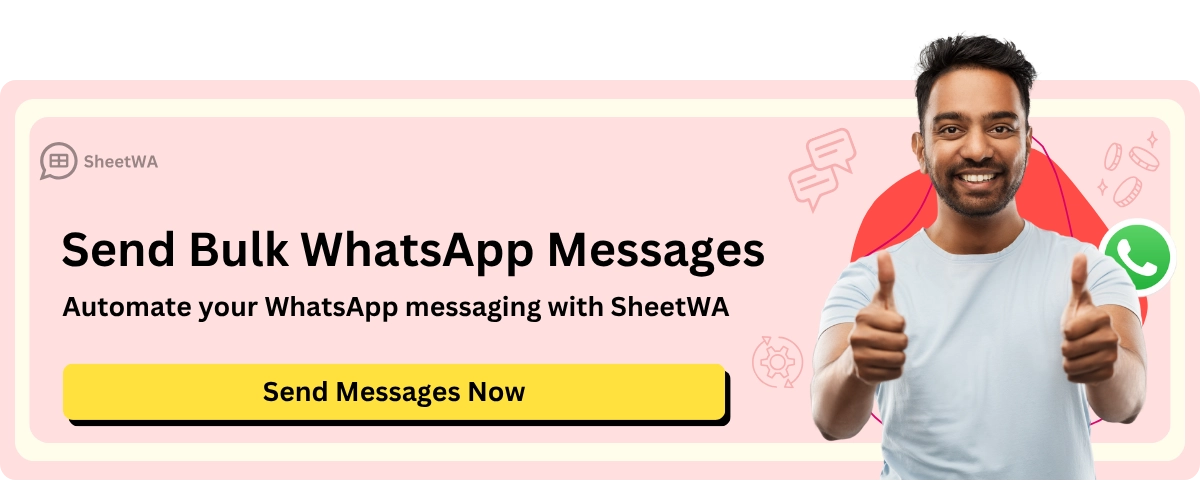
Here is how you start:
Get the SheetWA extension from the Chrome Web Store. You can use Chrome or Edge.
Open WhatsApp Web in your browser. SheetWA will connect by itself.
Log in to SheetWA with Google authentication. This links your account and lets you use your data.
Prepare your data file. You can use Google Sheets, Excel, or CSV files. Make sure your columns have clear labels like PhoneNumber, Name, and Message.
Upload or connect your spreadsheet. For Google Sheets, paste the sheet URL. For Excel or CSV, upload the file.
Match your columns. Pick which column has phone numbers and which has names or other info.
Write your message. You can make a new message or use a saved template. Add placeholders like {Name} to make each message personal.
Attach media files if you want. You can add images, videos, or documents.
Set random time gaps between messages. This helps stop spam detection and keeps your WhatsApp account safe.
Preview your messages. Check if everything is correct and if personalization works.
Click 'Send' to start automating WhatsApp messages. You can watch progress and see delivery reports.
Tip: You do not need coding skills to automate WhatsApp messages with SheetWA. The setup takes just a few minutes.
Data Preparation
Getting your data ready is very important for WhatsApp automation. You want your messages to go to the right people every time. Here are some good ways to prepare your data:
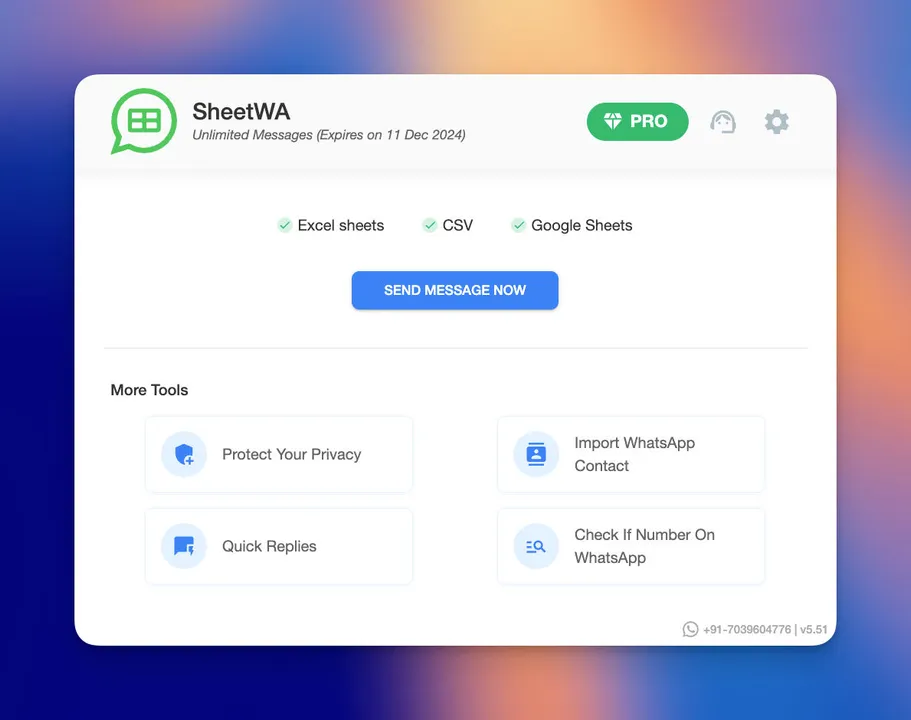
Organize your spreadsheet. Add columns for names, phone numbers, and message details.
Format phone numbers the right way. Always use the international format with a plus sign (+) and country code. For example, use +1 for the US, +44 for the UK, and +91 for India. Remove spaces, dashes, and zeros at the start.
Make sure every phone number is valid and on WhatsApp. Wrong numbers can cause delivery problems.
Match your columns in SheetWA. Link each column to the right placeholder in your message.
Get permission from people before you send automated WhatsApp messages. This follows WhatsApp rules and builds trust.
Send messages in groups. This lowers the chance of being marked as spam and helps you handle big lists.
Preview your messages before sending. Make sure everything is correct and looks professional.
Set time gaps between messages. A gap of 5 to 15 seconds looks like human behavior and keeps your account safe.
Data Preparation Checklist | Why It Matters |
|---|---|
Use clear column labels | Helps with mapping and personalization |
Format phone numbers | Ensures successful delivery |
Obtain recipient consent | Builds trust and follows policies |
Preview messages | Avoids mistakes and errors |
Send in batches | Reduces spam risk |
Set time gaps | Mimics human behavior |
Note: Good data formatting is very important when you automate WhatsApp messages. Always check your country codes and phone numbers.
Message Personalization
Making your WhatsApp messages personal helps your communication work better. When you automate WhatsApp messages, you can use data from your spreadsheet to make each message special.
Here is how you personalize your messages:
Write your message for your campaign or update.
Add placeholders like {Name}, {OrderID}, or {AppointmentDate} in your message. These placeholders use data from your spreadsheet.
Match each placeholder to the right column in SheetWA. For example, {Name} goes with the Name column.
Save your message as a template if you want to use it again. You can change templates for different campaigns.
Preview your personalized messages. Make sure each message looks good and has the right details.
Send your messages. Each person gets a message with their own name and info.
Personalization helps more people open and reply to messages. Studies show that personalized WhatsApp messages can raise open rates from 58% to about 70%. Customers like messages that fit their needs and interests.
Here is an example of a personalized message template:
Hello {Name}, your order {OrderID} is ready for pickup. Please visit our store on {AppointmentDate}.
You can automate tasks like sending order updates, appointment reminders, or payment notifications. Automating WhatsApp messages with personalization helps you build trust and keep customers interested.
Emoji: 😊 Adding emojis and media files can make your messages more fun and friendly.
Media Attachments
You can make WhatsApp messages more fun with media files. SheetWA lets you add images, videos, and documents to your messages. This helps you share more details and get customers’ attention.

You can send pictures to show products or events.
You can add videos to explain things or give short lessons.
You can attach PDFs for bills, brochures, or guides.
SheetWA works with these media types:
Images (JPEG, PNG)
Videos (MP4)
Documents (PDF)
You do not need to worry about file size. SheetWA does not say there are limits for media attachments. You can share what is important with your customers.
Tip: Media files help your messages stand out. Customers open and read messages with pictures or videos more often.
Here is a table that shows how brands use media attachments in WhatsApp campaigns and how it helps customer engagement:
Brand | Campaign Feature | Impact on Customer Engagement and Metrics |
|---|---|---|
Maggi | Interactive cooking course via WhatsApp | - 200,000 messages received in 8 weeks |
Vodafone | AI-powered WhatsApp chatbot with rich media support | - Over 1,000 customers engaged on day one |
When you add images, videos, or documents, your messages look better and are more fun. Customers reply faster and remember your brand more. Rich media helps you connect with people and makes your messages work better.

Note: Use media attachments to make WhatsApp campaigns more exciting. Pictures and videos help you show ideas, display products, and build trust with your audience.
How to Automate WhatsApp Messages
When you automate WhatsApp messages, you save time and help customers faster. You can set up replies that send by themselves. You can also plan messages to go out later. Chatbots can answer easy questions for you. Let’s see how you can use different tools to automate WhatsApp messages.
Setup Steps
Using WhatsApp Business App
If you have a small business, you can use the WhatsApp Business App. This app lets you set up simple automated messages. You do not need to know how to code. Here is what you do:
Download the WhatsApp Business App from your app store.
Sign up with your business phone number and fill in your profile.
Go to Settings and pick Business Tools.
Make a greeting message to say hello to new customers.
Set an away message for when you are not there.
Add quick replies for questions you get a lot.
Try sending messages to yourself or a friend to test them.
Tip: Write your replies in a friendly way. People like messages that sound real and nice.
Using WhatsApp Business API
The WhatsApp Business API is good for bigger businesses. You need to connect your account to a Business Solution Provider like Interakt. Here is how you do it:
Connect your Facebook Business Page to a solution provider.
Sign up with Meta Business Manager and check your phone number.
Send in business papers like GST for checking.
Make message templates for updates and reminders.
Link the API to your CRM or other tools with connectors.
Test your setup to make sure messages work right.
The API helps you send lots of messages at once. You must use approved templates and follow WhatsApp rules.
Step | Description |
|---|---|
Link BSP | Connect your business page with a solution provider |
Register & Verify | Register with Meta and verify your phone number |
Submit Documents | Provide business documents for approval |
Set Templates | Create message templates for automation |
Integrate API | Connect API with CRM or other platforms |
Test Workflows | Check if automated messages work as planned |
Using Third-Party Tools
Third-party tools make it easy to automate WhatsApp messages. You do not need to know how to code. Tools like Typebot let you build chatbots with drag-and-drop. Here is how you can do it:
Sign up for a tool like Typebot.
Use the builder to make your chatbot or message flow.
Add buttons, pictures, and rules to make chats fun.
Connect your chatbot to WhatsApp with the API and webhooks.
Try out your chatbot in WhatsApp to see how it works.
Share your chatbot with your customers.
Note: Third-party tools help you send messages for marketing, support, and finding new leads. You can make special flows for each customer group.
Scheduling Messages
Scheduling messages helps you talk to customers at the best time. You can send reminders, alerts, and deals without doing it by hand. Here are some tips to do it well and not bother people:
Use the customer’s name or details in each message.
Send messages when most people are online, like 6-8 PM.
Do not send too many messages. Two or three a week is enough.
Put your customers into groups so each gets the right info.
Use templates that WhatsApp has approved and let people opt out.
Do not send messages late at night or very early.
Try different times and ways of writing to see what works.
Check your stats to see who opens and answers. Change your plan if needed.
Do’s for Scheduling Messages | Don’ts for Scheduling Messages |
|---|---|
Personalize messages | Spam with multiple daily messages |
Schedule during peak hours | Send at odd hours |
Segment your audience | Use pushy language |
Use approved templates | Ignore opt-out requests |
Monitor analytics | Forget to review content |
Callout: Always ask customers if they want messages. Respect their privacy and let them stop messages easily.
Creating Chatbots
Chatbots help you answer questions and do simple jobs fast. You can use no-code tools like Typebot to make chatbots for WhatsApp. Here is how you make one:

Make an account on a chatbot tool like Typebot.
Build chat steps with text, buttons, and places to type.
Add rules so the chatbot knows what to say next.
Use pictures and videos to make chats more fun.
Connect your chatbot to WhatsApp with the API and webhooks.
Try your chatbot with different questions to see how it works.
Share your chatbot with your customers.
Chatbots can help book appointments, answer FAQs, and send order updates. They work in stores, hospitals, travel, and schools. Chatbots give help all day and night and save money by doing work for you.
Tip: Start your chatbot with a friendly hello. Use words that sound real and add the person’s name if you can. Always have a backup answer for questions the chatbot does not know.
Testing and Optimizing Chatbots
Testing your chatbot before using it for everyone is important. Here is what you should do:
Draw out how people will use the chatbot.
Write answers that are fun and use the person’s name.
Add pictures and buttons to make it easy to use.
Set up webhooks to talk to other tools in real time.
Test the chatbot by acting like a customer.
Fix any problems you find.
Turn on your WhatsApp Business API and do a small test run.
Watch how the chatbot does with analytics.
Use what you learn to make the chatbot better.
Make sure you follow WhatsApp rules and keep data safe.
Alert: Keep testing and making your chatbot better. Watch things like how fast it answers and if customers are happy.
Automating WhatsApp messages helps you do simple jobs, send updates, and give quick help. You can use the WhatsApp Business App, API, or other tools to set up automation and chatbots. Testing and improving your setup helps you give customers the best service.
Best Practices for WhatsApp Message Automation
Personalization
You can make WhatsApp messages special by adding a personal touch. Customers feel important when you use their names or talk about what they bought last time. Split your audience into groups by what they buy, where they live, or how they act. This helps you send messages that fit each group. Chatbots can answer based on what people type. Add agent names or signatures to make chats feel friendly and real. Try to keep the same agent with the same customer. This helps build trust and keeps your service steady.
Put customer names in every message you send.
Share tips, guides, or deals based on what customers like.
Set up replies that change when users give different answers.
Make messages personal by using customer data and checking analytics.
Test your messages often and change them to see what works best.
When you make things personal, customers want to come back and buy again. Always mix automation with a human feel. People want to talk to a real person, not just a robot.
Tip: Use message templates that show agent names and contact links. This helps your business look professional and caring.
Compliance
Following the rules keeps your business safe. Always ask customers before sending them automated messages. Follow privacy laws like GDPR, CCPA, or LGPD, depending on where your customers live. Keep customer data safe and use encryption to protect it. Always say who you are in every message and let people stop messages if they want.

Ask customers to join before you send messages.
Let customers stop messages easily.
Keep track of who said yes and when.
Do not send too many messages or spam people.
Use safe tools to store and manage customer data.
Follow WhatsApp Business rules and local laws.
Some businesses, like healthcare or finance, have extra rules. Keep good records of all chats if your business needs to show proof later. Teach your team about these rules and update your process when laws change.
Alert: If you break privacy rules, you can get fined or lose your WhatsApp account. Always check for new rules and stay updated.
Monitoring
Watching your WhatsApp automation helps you know what works. Use analytics to see how many messages are sent, opened, or clicked. Check how fast you answer and how many customers reply. Try A/B testing to see which messages work better. Change your workflows often to match what customers want.
Track how many messages are sent, opened, and clicked for each campaign.
Measure how fast you answer and solve customer questions.
Use dashboards to see all your data in one place.
Test different message styles and times with small groups.
Compare your costs and sales to see if you are making money.
For chatbots, check how many questions they answer and if customers are happy after chatting. Use feedback from customers to fix problems and make your automation better.
Note: Checking your automation often helps you find problems early and keep your service working well.
Real-World Examples

Customer Support Transformation
WhatsApp automation helps customer support in many fields. Businesses use automated messages to answer questions fast. This makes solving problems easier and helps customers quickly. It saves time and makes people happier.
The table below shows how different industries use WhatsApp automation:
Industry | Use Case Example | Description of WhatsApp Automation Impact |
|---|---|---|
Airlines | Booking modifications, seat selection, payments | Customers book, pick seats, and pay fast on WhatsApp. This makes things quicker and easier. |
Automotive | Test drive booking | Customers book test drives in less than 30 seconds. This speeds up the process. |
Banking | Account opening, card activation | Secure and quick digital steps replace slow old ways. |
E-commerce | Shipping complaints, marketing campaigns | Complaints get fixed fast and ads are sent just for you. |
Insurance | Claims, quotes, roadside assistance | Filing claims and asking for help is easy on WhatsApp. This lowers stress and wait times. |
Telecommunications | Top-ups | Adding money to your account is simple with chat. This makes customers happier. |
Utilities | Contract owner changes, meter readings | Contracts and meter readings are updated fast. This saves time for customers. |
Companies like Lombarda Motori and Dr. Ortho use WhatsApp automation too. Lombarda Motori sells cars faster and makes customers happier. Dr. Ortho answered over 30,000 questions with automated chats. They also sold more by helping people right away. Jobstars India used a WhatsApp chatbot to talk to job seekers in many languages. This cut manual work by 40% and helped sales go up by 60%.
Tip: Using WhatsApp automation helps customers get answers fast. It also makes your team work better.
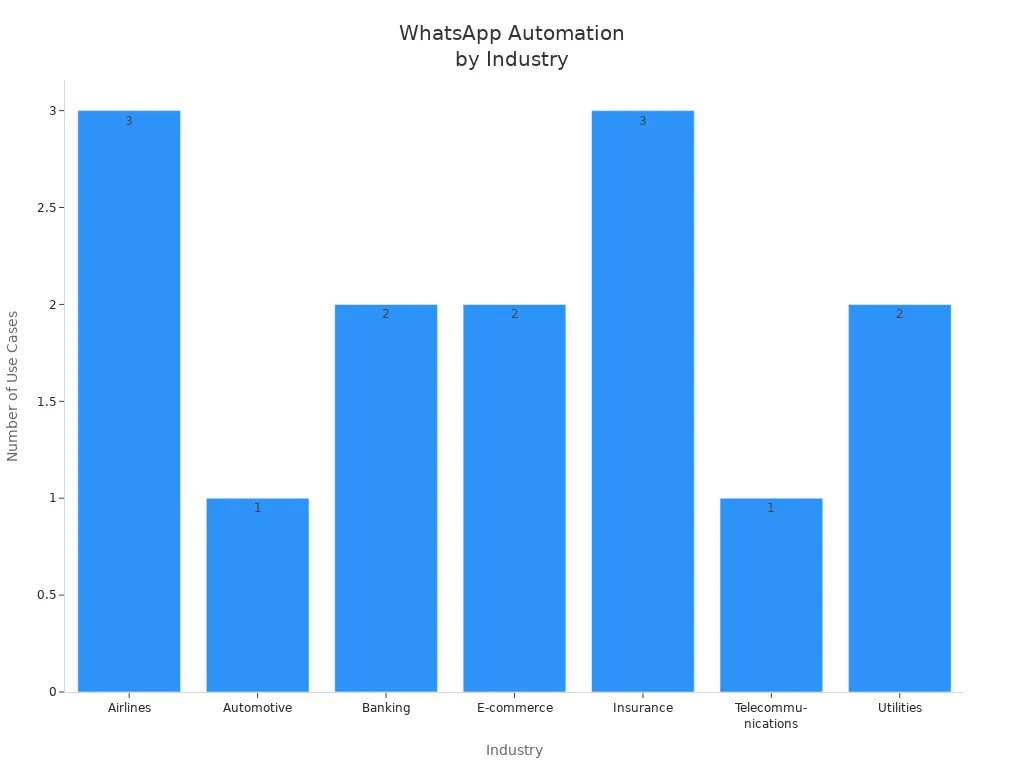
Automated Marketing Campaigns
WhatsApp automation lets you send marketing messages to more people. These messages keep customers interested and help you sell more. Many brands send reminders for carts, welcome notes, and special deals. This helps customers come back and buy again.
Retail, travel, and banking companies use WhatsApp for deals and updates. WhatsApp Flows and carousel messages help guide customers to buy things in the app. Shopping becomes easy and fun. Research shows WhatsApp marketing can help keep customers by 42% more in six months. You can also see a 70% rise in how long customers stay with your brand.
Big brands like Netflix and Unilever use WhatsApp for alerts, surveys, and tips. About 70% of people say they want to buy from businesses that use chat apps. Sales from WhatsApp and other chat apps are growing fast. They could reach $290 billion by 2026. WhatsApp automation makes it easy for customers to buy, get help, and share feedback.
Note: WhatsApp marketing works well because people read messages quickly. This helps you reach your audience and grow your business.
Appointment Reminders
WhatsApp automation helps remind customers about appointments. This helps people remember their bookings and miss fewer visits. Clinics, salons, and gyms use reminders to keep schedules full and customers happy.
A skin clinic used WhatsApp reminders and missed visits dropped by 30% in three months. Beauty salons that send booking notes and reminders got 20% more bookings. Fitness studios that remind members about classes saw attendance go up by 15%. The chart below shows how WhatsApp reminders help different businesses:
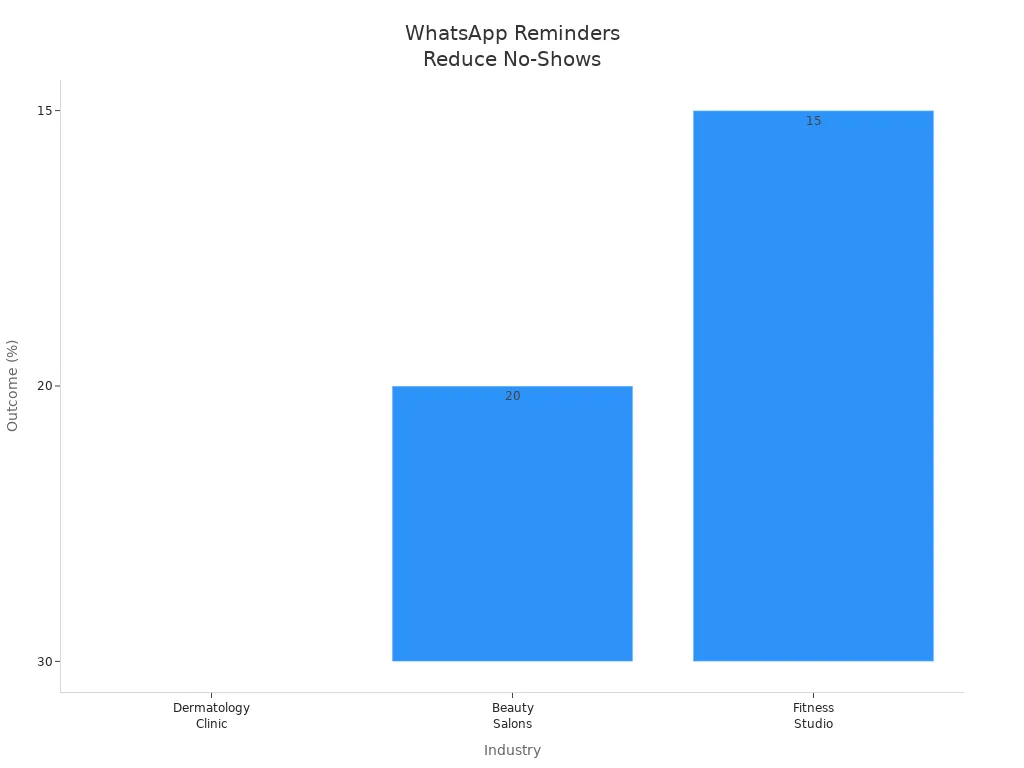
Some clinics let patients confirm, change, or cancel appointments in the chat. This makes scheduling easy and keeps everyone on track. Using WhatsApp reminders saves time and helps customers feel cared for.
Callout: Automated reminders help your business run smoothly. They also help customers come back again.
WhatsApp message automation helps your business in many ways. You can . Customers will talk to your business more often. Your team will not have to do as much work, so you save money. The table below shows some main benefits:
Benefit | Example |
|---|---|
Faster Response Times | Auto-replies to FAQs |
24/7 Customer Support | Chatbots answer anytime |
Cost Savings | Less manual work for your team |
Personalized Messaging | Welcome notes and reminders |
If you want to start, try these ideas: - Use the WhatsApp Business App for easy automations. - Set up auto-replies for questions you get a lot. - Try chatbots and drip campaigns if you need more help.
Pick the best platform and follow good tips. This will help your business work better and make your customers happier.

FAQ
What is WhatsApp message automation?
WhatsApp message automation helps you send messages without typing each one. You set up replies, reminders, or updates ahead of time. The system sends these messages for you. This saves you time and helps you answer faster.
Can I use WhatsApp automation for free?
You can use some automation features for free with the WhatsApp Business App. If you want advanced tools like chatbots or sending lots of messages, you might need to pay. Some third-party platforms and the WhatsApp Business API cost money.
Is WhatsApp automation safe for my business?
Yes, WhatsApp uses end-to-end encryption to keep chats private. Always use official tools or trusted partners. This keeps your customer data safe and follows privacy rules.
How do I personalize automated messages?
You can add customer names, order details, or special deals to your messages. Many tools let you use templates with special parts that change. This makes each message feel friendly and personal.
Will customers know if messages are automated?
Most customers can tell if a message is automated. You can make messages feel more real by using friendly words and personal details. Always give customers a way to talk to a real person.
What types of businesses benefit from WhatsApp automation?
All kinds of businesses can use WhatsApp automation. Stores, clinics, schools, and service companies use it for support, reminders, and marketing. Automation helps you save time and reach more people.
Can I schedule WhatsApp messages in advance?
Yes, you can schedule messages with the WhatsApp Business App or other tools. This helps you send reminders, alerts, or deals at the best time for your customers.
What should I avoid when automating WhatsApp messages?
Do not spam customers. Do not send too many messages. Always get customer consent. Use clear words. Let customers opt out easily. Test your messages before sending them to everyone.

